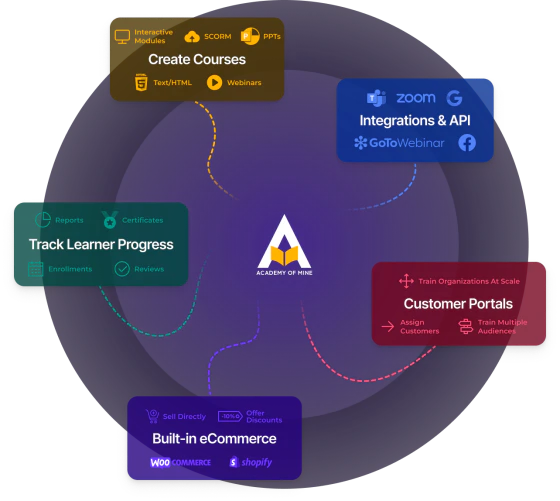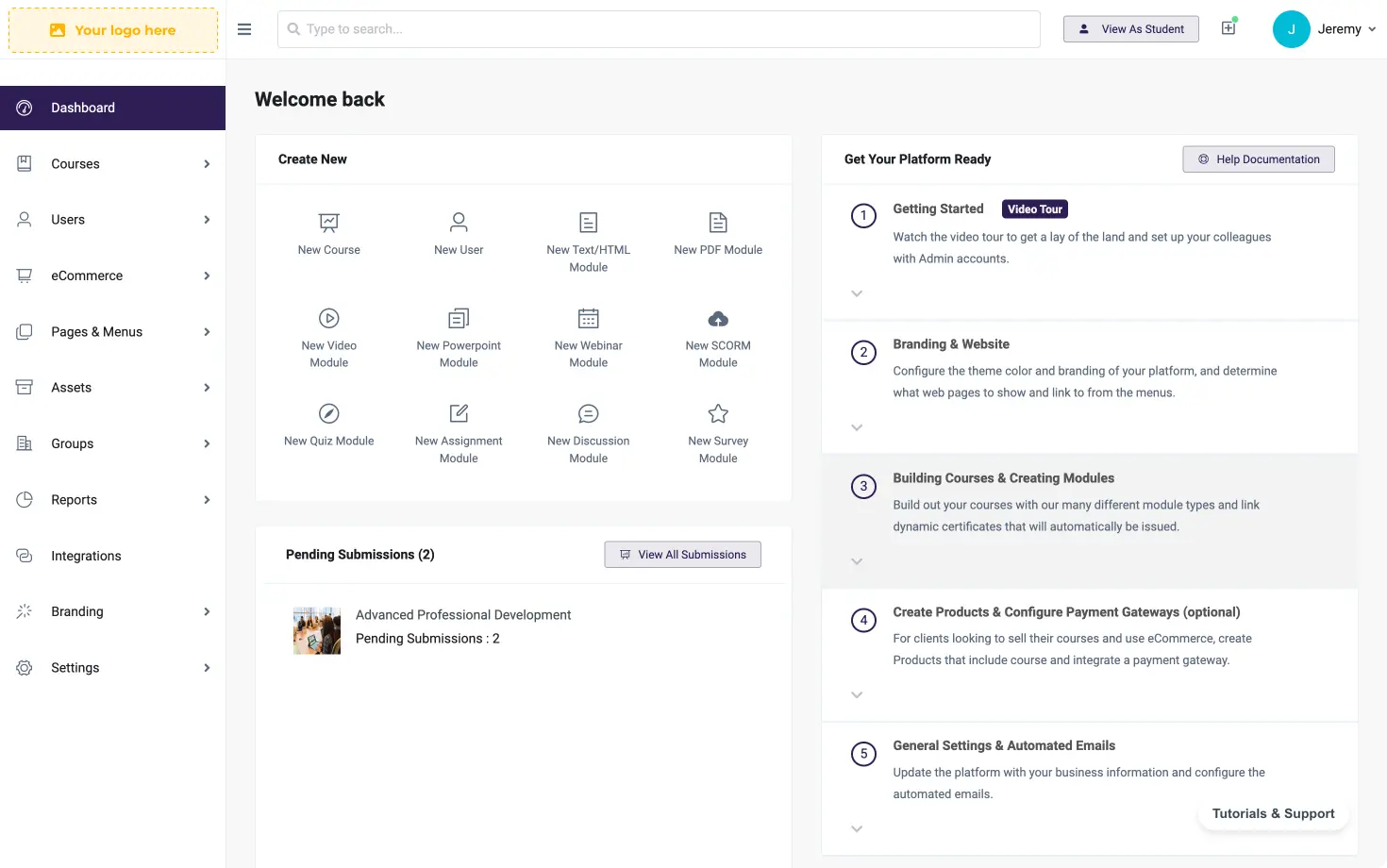Continuing Education, Learning Management System, Professional Training
What can an LMS be used for?

Yes, a learning management system doesn’t just apply to k-12 schools and universities providing educational courses online.
LMSs are used by organizations both small and large and in different industries, to deliver, manage, and track learning and development programs. It also doesn’t matter who you’re training because LMSs are effective for training internally and externally – if the concept involves learning and training, an LMS makes sense!
Here are the LMS use cases we’ll be covering today:
- B2B training
- Employee training
- Selling eLearning courses
- Training remotely
- Enable sales teams
- Member training
- Customer & partner training
- Employee onboarding
- Knowledge retention
- Support education
- Compliance training
B2B training
Are you interested in scaling your B2B training?
Learning Management systems give you that option! Train multiple organizations efficiently, keep training programs white-labeled, and restrict access to customer portals so that outside users can’t get in.
An LMS lets you bulk onboard users into training portals (groups) and then assign each group with an admin so that your customers can manage their training portals as if they had their own LMS. Group admins are responsible for administrative tasks like monitoring user progress, responding to user messages, reporting on users’ activity within a course, and more.
Equally important, if a customer wants to purchase more training courses, you can easily give that customer access to more courses within their portal so their organization can keep learning!
Employee training
Training employees becomes straightforward when using an LMS. Quickly deliver state-mandated compliance training or product training to your team, then measure their progress and track results live.
Let’s say you’re a construction company and your employees need to renew their OSHA certifications once a year or take regular safety training. On-the-job training won’t be necessary for every scenario, and using an LMS, your team can get certified and retrain in their own time. The best part is, most standard recertifications are filled with online activities and assessments that can be automated using self-paced courses; very inexpensive.
Your organization could even separate the types of training based on roles so that managers and leaders are put to the test as well – when managers are going beyond just “fulfilling job responsibilities”, the training their teams receive is that much more effective.
Selling eLearning courses
If you want to sell courses to customers, then you need to have an eCommerce store where people can go online and make purchases. Any good LMS like ours allows you to create courses and then sell them on a marketing landing page (either created with the LMS or externally).
If you’re looking for an LMS that allows you to build out a marketing page within the platform, look for one that integrates with established and trustworthy payment gateways like Stripe and Braintree by Paypal.
Bonus: look for a platform with an intuitive and flexible page builder, so that your marketing page can be white-labeled and optimized for conversions!
Train remotely
If you think the work-from-home environment is hugely in demand right now, just wait a few more years. By 2025, some 70 percent of the workforce will work remotely at least five days a month!
Shave off some expenses in your business by training your employees, third-party customers, and or partners remotely using a Learning Management System (LMS); it’s essential regardless of the industry, type of training, or size of your organization.
Enable sales teams
Salespeople need to constantly train in order to be effective in selling products and services for a company. An online training platform can make it easier for sales teams to close more deals!
As companies grow, products and services change, and best practices evolve quickly – use an LMS to host live-training workshops using platforms like Zoom and Microsoft Teams. If a training program is less urgent, create and deliver it in the form of a self-paced course that your salespeople can access on-demand.
Member training
Let’s say you have an upscale private gym with 150 active members. What better way to keep members involved than providing them with member training on different workouts and diets they can follow? The best part is, training courses can be created one time and continuously offered to members for years to come (updating as needed)!
Depending on your organization and industry, you might find live training on occasion to be helpful in keeping members impressed with your service! For example: let’s say your company offers training to new mothers – you could host monthly instructor-led training sessions on Zoom, teaching mothers remotely how to feed their newborn babies.
Customer and partner training
Many SMBs and enterprises use an LMS to train their customers and partners. Offering continuing education (CE) and professional development courses alongside a core product or service is a great way to retain customers and keep them satisfied.
Regardless if you’re selling training using an eCommerce page or giving complimentary training as part of a partner contract; training portals will save you from having to manually onboard learners in bulk.
Your organization can also seamlessly host webinars and train groups of customers or partners in real-time using an LMS.
If you are selling training courses, you might be interested in using subscription models so that customers can pay weekly, monthly, or quarterly.
Employee onboarding
Get off on the right foot with every employee using an effective onboarding system. If you need help augmenting your onboarding process and making it more convenient for team members and new hires, an LMS could be helpful.
Your LMS is the perfect place for new hires to familiarize themselves with your company’s compliance policies, values and conduct code, and other important documentation. You can also explain job responsibilities, benefits, and incentives plans or career growth opportunities using the platform.
You can think of an LMS as a resource center that employees have access to, and can use to sharpen their job skills or refresh their memory on company information anytime. Of course, if you’re not hiring remote employees, taking a tour around the office and being introduced to coworkers will always be important. However, an LMS can streamline the majority of your company’s onboarding.
Employee development and knowledge retention
When an employee needs his/her current skills enhanced or new skills to help perform better in their job, an LMS can provide that “schooling” using learning courses and programs. As of 2021, employee development is the number #1 factor for employee retention, especially among Millennials.
Whether you’re training employees on new product updates, customer changes in your business, or helping them acquire new skills with leadership development; the process can be automated.
Support Education
Moodle and Canvas are platforms specifically designed to support education, but all LMSs by default can handle this type of learning. Using an LMS, you can deliver educational content to students, monitor their progress in a classroom, and interact with them personally or in group settings. One of our clients, Model Teaching uses their LMS to deliver courses to K12 teachers and different schools and districts.
Assessments like quizzes and tests make grading students simple, and video integrations allow instructors to teach in real-time using webinars.
Compliance training
Employees want to feel safe and comfortable while at work! Can you blame them?
Implementing training on sexual harassment, diversity, and workplace substance abuse are all great examples of compliance training. Compliance training shouldn’t be overlooked, it can positively influence your company’s culture! Take action now, and use an LMS to efficiently avoid regulatory compliance issues.
So many LMS providers to choose from…
Each organization has different goals and unique needs. We’d love to chat through this to help you figure out which features should be in your LMS. Let’s talk and see if our platform can solve your company’s training and learning needs today!

